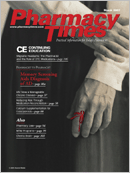Publication
Article
Pharmacy Times
compounding HOTLINE
Author(s):
Q:A formulation calls for "capric/caprylic triglyceride."What is that?
A:"Capric/caprylic triglyceride" is a synonym for mediumchaintriglycerides (MCT), also known as MCT oil, oleumneutrale, oleum vegetable tenue, and thin vegetable oil.It is a colorless or slightly yellow, oily liquid with almost noodor and no taste that solidifies at about 0°C. At low temperatures,it can exhibit high viscosity, and, therefore, it should bewarmed before incorporating it into a preparation to ensuremiscibility. It should be stored in a filled and closed containerat temperatures around 25°C (brief excursions above 40°C willnot have a significant deleterious effect). The material is sterilizedfor use in parenteral preparations by heating to 170°C for1 hour with suitable equipment. It has a density of approximately0.95 g/cm3. Brand names include Bergabest, Captex300, Crodamol GTCC, Neobee M5, and Miglyol 810 and 812.Its Chemical Abstracts Service number is 73398-61-5 andmolecular weight is about 500 (avg). The EuropeanPharmacopoeia 2005 describes the material as a fixed oilderived from coconut oil (it also is derived from palm [palmkernel oil]), consisting of a mixture of saturated fatty acids—primarily caprylic acid and capric acid. MCT oil is used pharmaceuticallyas an emulsifying agent, solvent, or suspendingagent, and as a therapeutic agent (dietary supplement in fatmalabsorption conditions).
In topical preparations, the material helps with emollientand spreading effects without leaving a film, allows skin respiration,and has good penetrating qualities. Rectally, it hasbeen used as a component of suppositories. Parenterally, ithas been used with long-chain triglycerides in total parenteralnutrition and as an emulsifier and viscosity-increasingagent. The material is listed as "generally recognized as safe"and is included in the FDA Inactive Ingredients Guide for usein topical preparations. Toxicologically, according to theHandbook of Pharmaceutical Excipients, 5th edition, thematerial is regarded to be generally nontoxic and nonirritant.
An anhydrous vehicle based on MCT oil has beendescribed (Allen LV Jr. Medium-chain triglycerides oral vehicle,anhydrous. International Journal of PharmaceuticalCompounding. Jan/Feb 2006;10:63). The author notes thatassigning a beyond-use date of up to 6 months, when appropriatelypackaged, is appropriate for this vehicle. It has theadvantage of having a slightly sweet taste "somewhat likecake icing."
Mr. Erickson is director of professional affairs at Gallipot Inc.
E-mail your compounding questions to[email protected]

Newsletter
Stay informed on drug updates, treatment guidelines, and pharmacy practice trends—subscribe to Pharmacy Times for weekly clinical insights.






